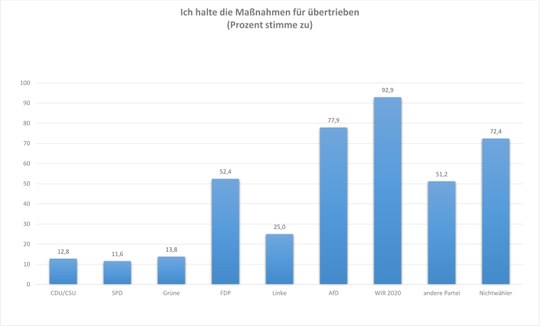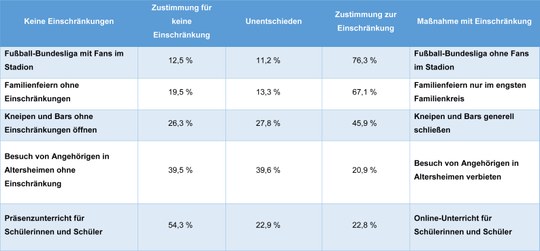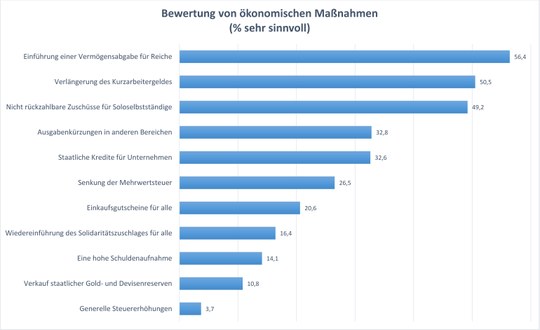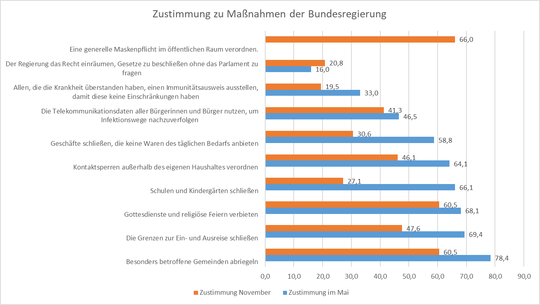Approval for quarantine measures remains high
Freiburg, Nov 11, 2020
Approval of the German government’s quarantine measures is still high. That’s the conclusion of a study by a research team from the Universities of Freiburg and Stuttgart. In the period from 29 October to 9 November, 2020, the researchers conducted an online survey of 7,881 people nationwide, asking them about their experiences and attitudes during the coronavirus pandemic. This, after nearly 10,000 people participated in a first survey in May 2020. The results are now presented by Professor Uwe Wagschal, Dr. Sebastian Jäckle, Dr. Eva-Maria Trüdinger and Dr. Achim Hildebrandt. Only 30.5 percent of those surveyed consider the government measures to be exaggerated - a slight fall compared to the May survey. And only 24.5 percent think that everyone should decide for themselves how to deal with coronavirus.
However, there are clear differences between the supporters of the various political parties. While the supporters of CDU/CSU, SPD, the Greens and the Left Party are very clearly in favor of the coronavirus measures, the supporters of the FDP and the AfD - and protest groups such as Widerstand 2020 - show a clear rejection. Non-voters also reject the measures to a large extent. From this, the research team concludes that the population seems to be polarized, but not nearly as strongly as in the United States.
Overall, the various social distancing measures appear to be judged on their merits. While the vast majority of those surveyed are against Bundesliga soccer games with fans in the stadium and are also in favor of keeping family celebrations small, the population is somewhat more tolerant when it comes to bars and pubs; more than a quarter of respondents were in favor of opening up without restrictions. And for most respondents, it is important that schools remain open and that lessons are held there. More than half of those surveyed are in favor of in-class instruction, while only slightly more than 20 percent prefer online instruction. The desire for children to be taught in school becomes even clearer among families with children. In their case, approval for open schools is more than 61 percent, and for families with several small children it is over 75 percent.
As the researchers explain, people’s own behavior indicates support for government measures. Ultimately, 59 percent of those surveyed use the German coronavirus tracing app. In July, a survey by the industry association Bitkom revealed a usage rate of 53 percent; in the meantime more people have downloaded the app. While men use the app somewhat more frequently than women, women are more likely to wear a covering over their mouth and nose (88.8 to 81.4 percent, in total 85.0 percent). Moreover, during the crisis women restricted their contacts somewhat more than men (87.4 to 82.4 percent, 84.9 percent in total).
How should the coronavirus crisis be managed economically and financially? To this end, the researchers asked to what extent measures already adopted by policymakers and possible other measures are sensible or not sensible. The majority has a clear idea of who should pay for the costs of the pandemic - more than 56 percent of those surveyed therefore consider a wealth tax for the rich to be a very good idea. That is more than five percentage points more than in the May survey. In contrast, only just under four percent agree that general tax increases are a very good idea and 29 percent only partly agree that they are a good idea. There is also little support for the sale of the state's emergency reserves of gold or foreign currency reserves, nor for increased borrowing or the reintroduction of the solidarity tax; only around 16 percent of those surveyed thought these measures would be a very good idea. Yet there is particularly strong approval for the measures introduced during the coronavirus crisis, such as the extension of paid furlough schemes and non-repayable subsidies for the self-employed.
In addition to the economic measures, the research team also asked about the acceptance of measures to contain and limit the pandemic. The highest level of acceptance was for the introduction of a general mandate to wear masks. In comparison to the survey in May, the latest study shows a noticeable decline in approval for a number of social distancing measures. Attitudes toward school closures have changed most. Now only 27.1 percent are in favor of closing kindergartens and schools, compared to 66.1 percent in May. Border closures, the sealing off of communities, business closures and contact closures are also clearly losing support.
People’s evaluation of the work of the federal government, the state government and their local mayor, there is a clear winner: the federal government. While 39.4 percent of those questioned generally say the federal government has done a good job, 56.6 percent are very satisfied or rather satisfied with the federal government in the coronavirus crisis. Only 29.4 percent are dissatisfied with Berlin. Around half of those surveyed are rather or very satisfied with local mayors, with no difference between the general assessment and the assessment of performance in the coronavirus crisis. State governments fared worst - only 45.8 percent of respondents are satisfied with the work of their state government in the coronavirus crisis. The state governments in Baden-Württemberg, Lower Saxony and Schleswig-Holstein come off better than others. In contrast, the state governments in Saarland, Berlin, Bavaria, North Rhine-Westphalia and Hesse are rated particularly poorly.
www.politikpanel.uni-freiburg.de
Would you like to participate in future Politikpanel Deutschland surveys? Send an e-mail to politikpanel-liste-subscribe@politik.uni-freiburg.de to subscribe to the mailing list. You will be asked to participate in a maximum of four surveys per year.

Figure 1: Assessment of coronavirus measures according to party affiliation
Source: Politikpanel Deutschland

Table 1: Attitudes to quarantine measures
Source: Politikpanel Deutschland

Figure 2: Assessment of economic measures to combat the crisis
Source: Politikpanel Deutschland
 Figure 3: Approval of economic measures to combat the crisis
Figure 3: Approval of economic measures to combat the crisis
Note: The question about a mask-wearing mandate was not asked in May.
Source: Politikpanel Deutschland
Contact:
Professor Dr. Uwe Wagschal
Department of Political Science
University of Freiburg
Phone: 0761/203-9361
politikpanel@politik.uni-freiburg.de

